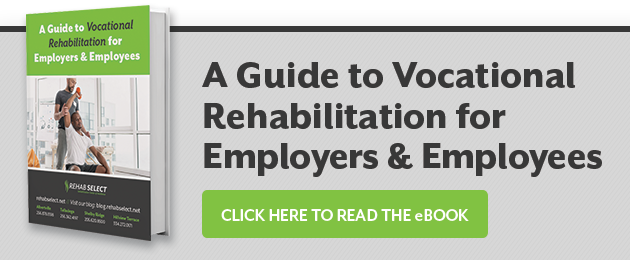
As a nurse case manager, you naturally want to place patients at a rehab facility that can deliver the best outcomes for patients while supporting your relationships with claim adjusters. But how do you objectively evaluate a workers’ comp program?
It pays to ask around. Understanding a program's service quality often comes down to knowing the provider's reputation. Choose a facility that specializes in the work injury rehab process and tailors each patient's goals individually. A reputable workers’ comp rehab facility should also help you work with adjusters to achieve realistic, quality outcomes cost-effectively.
To find top-notch care for patients and a facility that will make coordination smooth, you’ll need to perform your due diligence. Here’s how to determine if a workers’ comp program is the right fit.
Questions to Ask When Evaluating a Work Injury Rehab Facility
1. Does the facility have a dedicated point of contact for the nurse case manager?
Tracking down different parties (e.g., physicians and therapists) to get patient care updates can delay communications and impact your relationships with adjusters. Instead, choose a rehab facility that provides a single point of contact who can answer your questions promptly and share updates frequently.
This contact person is typically an administrator or therapy director. They should provide you with weekly reports on what happens during doctors’ appointments, changes to the patient's medication, and their recovery process — information you need to promptly provide to claim adjusters.
2. Does the work injury rehabilitation program have a good reputation and a steady presence in the industry?
Seek programs you consistently encounter at conferences and industry events. These are good signs that the facility is up to date with standards and staff education. Also, ask for referrals, testimonials, and patient outcomes metrics when evaluating your options. Word of mouth means a lot in the industry — plus, it can help you understand the nuances of a program to see if it's a good fit for a patient.
3. Does the facility have a structured communication process for patient progress?
Choose a worker injury rehab program that keeps you in the loop. For example, at Rehab Select, we invite nurse case managers to our weekly interdisciplinary meetings so they can be active participants in the process.
They can get all the information they need from the nurse practitioner, physician, and discharge planner during the meeting without calling up each person to search for answers. They can also interact face-to-face with the therapists treating their patients to gain in-depth insights into the progress.
Nurse case managers often monitor 30 or 40 patients concurrently. The workload further highlights the importance of good communication. Having a single point of contact and being part of the care team's interdisciplinary meeting can help you streamline workflows and save time by getting all the information you need in one fell swoop.
4. Will the rehab program be able to support the patient's functional goals?
The facility should collaborate with you to determine each patient's functional goals and tailor the worker's comp occupational therapy regimen to match the level of care each patient requires to return home and/or get back to work as quickly as possible.
5. Does the facility employ in-house therapists?
Many rehab facilities contract out therapy work. Patients often get different therapists throughout their stay, leading to inconsistent care that impacts treatment outcomes. On the other hand, a program that employs in-house employees for workers’ comp physical therapy is more likely to build trust with patients, increase compliance, and achieve better results.
For example, we ensure patients receive consistent care by employing all therapists in-house, including workers’ comp occupational therapy workers. Many of these professionals have been with us for many years and are dedicated to our patients and their results.
6. Does the workers’ comp program have the capabilities to handle complex cases?
Find out if a program can handle acute or complicated cases (e.g., getting a patient to eat without a feeding tube or teaching them to walk again.) Not every facility can handle complex conditions — besides having the right capabilities, it must also have the ability to respond quickly since time is of the essence in many acute situations.
7. What's the facility's physician and nurse practitioner coverage?
A facility should have highly trained medical professionals on duty. For example, our nurse practitioners are available at least five days a week for eight hours daily. This kind of oversight allows us to accept medically complex cases and deliver the appropriate care.
In fact, professional nursing care often makes the difference between inpatient and outpatient care. Our nurse practitioners can closely monitor patient conditions and perform procedures like tracheotomies or IV antibiotics to achieve optimal patient outcomes.
8. What does discharge planning look like, and how is it structured?
A rehab facility is often the mid-point between a hospital stay and a lesser level of care (e.g., home care and outpatient worker's comp occupational therapy.) Discharge planning is a critical component to ensure a safe and efficient transition.
The facility should support timely discharge to help you balance expenses with patient outcomes, so you can help adjustors lower medical costs without compromising results. It should also share affordable treatment options when appropriate so you can guide adjusters to make the most cost-effective decisions.
Finding a Worker's Comp Rehab Facility in Alabama
Partnering with a reputable work injury rehabilitation facility allows nurse case managers to do their best in supporting patients in their recovery journey and adjusters throughout the claim process. Worker's comp physical therapy is essential in any work injury rehabilitation program, so you’ll want to find a program that provides an optimal therapy experience. Inpatient care provides more opportunities for therapy, while the controlled environment ensures that patients will receive the appropriate medications and treatments at the right time per physician orders to accelerate recovery.
Rehab Select has the team, the process, and the experience to ensure the highest standards in delivering worker's comp physical therapy and work injury rehabilitation in Alabama. Contact us or schedule a tour to learn more.





